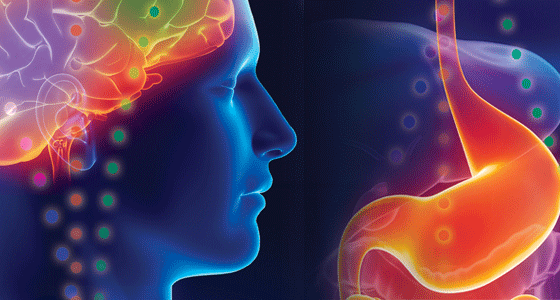Why You Should Strengthen Your Brain-Gut Connection
by Jerry Nelson for Psych Central:
People often talk about a “gut feeling” when they meet someone for the first time. From the time we’re young adults, we’re told to “trust our gut instinct” when making decisions. It is common to pause for a “gut check” when faced with situations that test our mettle and resolve.
The brain-gut relationship is more than metaphorical. Our head and gut are joined by a network of neurons and chemicals that provide feedback about how starved we are, whether we’re under pressure or not or if we’ve consumed a microbe we shouldn’t have.
The information pathway is named the “brain-gut” axis and provides natural and immediate updates on the body’s status of affairs. That drowning feeling in the pit of your belly after checking out the post-holiday bills is a clear illustration of the brain-gut relationship at work.
As in any ecosystem populated by opposing species, the ecosystem in the gut commands that inhabitants survive. Just as forest creatures would struggle in the desert, microbes that rely on the mucus layer will flounder in a gut where mucus is sparse. Build up the mucus and microbes will be staging a rally. The nervous system can help decree which microbes inhabit the gut, even if the choices are not conscious. It’s mind over microbes.
The brain-gut connection has seen major breakthroughs in neuroscience and psychology research recently. In 2015, research found that increasing the balance of healthy bacteria in the gut and help reduce anxiety and lessen symptoms of depression.
One study showed that individuals with more fermented foods in their diet exhibit less neuroticism and social anxiety. “It is plausible that the probiotics in the fermented foods are positively improving the conditions in the gut and changes in the gut, in turn, impact social anxiety,” Dr. Matthew, assistant professor and one of the study’s authors, said.
Is Yogurt the Path to Happiness?
Recent research into the brain-gut connection shows that the signals sent between the brain and gut travel both ways. The meaning of this? The nourishments you consume can have a potent impact on your attitude.
Yogurt, for example, is a mood booster — a powerful one. The probiotics in yogurt contribute mood-lifting benefits and exert incredible power over one’s body. Not only may balance microbiota ward off depression, weight gain, and disease, it’s a two-way highway.
Tension and stress in the cerebrum can affect your gastrointestinal well-being and the bacteria already in the digestive system can influence how you become stressed. Consuming yogurt promotes the proliferation of advantageous, mood-enhancing bacteria, making it a mood raising snack on a deep level.
If a person can’t eat dairy, there are other creamy, probiotic options such as goat’s milk or coconut milk. The non-dairy options may be tolerated better and are equally as comforting.
Depression
Humans have two brains. The second is called our enteric nervous system and consists of over 100 million neurons that are in the walls of the long tube of our gut beginning at the esophagus and ending at the anus. Measuring nine meters long, it is deeper than most swimming pools.
As important as the neurons in the gut is the bacteria found there. Our bodies are dwelling places for over 100 trillion bacterial and microbes — known as our microbiome. Besides breaking down our food, fighting infection and boosting our immune system, the microbiome plays an important role in our mental health.
John F. Cryan, a neuropharmacologist and microbiome expert from the University College Cork in Ireland, is ahead of the curve in exploring the link between gut and brain health. Working closely with gastroenterologists, microbiologists and psychiatrists, Cryan is finding the effects of gut bacteria on the brain.
Cryan, and fellow researchers, found that when mice are bred in sterile conditions — void of beneficial bacteria — they do not interact with other mice and behave with social awkwardness. When the microbiome was disrupted, the mice copied human anxiety and depression.
So what does this mean in terms of Strengthening the Brain-Gut Connection?
In one of Cryan’s studies, two varieties of Bifidobacterium produced by his lab were more effective than Lexapro when treating anxious and depressed behavior. In clinical trials, individuals taking probiotics reported feeling more resilient. The more researchers study the link between gastrointestinal problems and mood disruptions, the more convinced they become of how the two brains work together.

